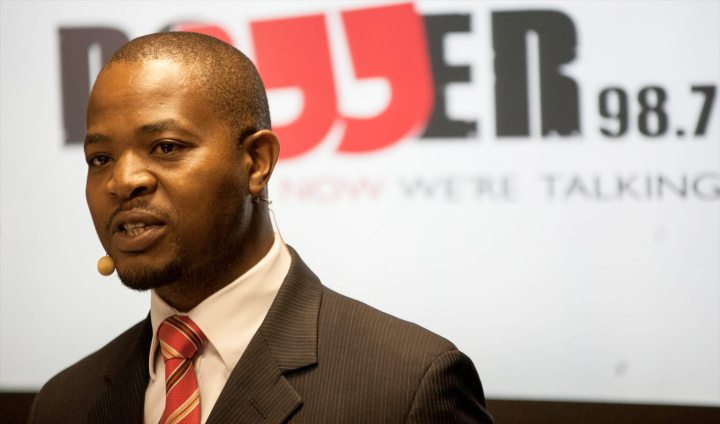Maverick Life
Power FM to the people

After five years in the making, Given Mkhari’s Power FM held its media launch in Johannesburg on Wednesday, ahead of its on-air debut on 18 June. The Gauteng station promised to change the country forever, offering a new platform for individuals to be themselves and participate in the country’s future. The critics think it will work, if the execution matches the formula. By JESSICA EATON & GREG NICOLSON.
Seven years ago, while playing golf with his business partner, Given Mkhari decided his rookie sporting skills had something in common with South Africa’s existing radio stations. Already the owner of Polokwane-based CapricornFM, it was then that he decided he would apply for the next available frequency on South African radio. He would call it Power FM. This came after the realisation that “South Africans had been outsourcing their lives to our politicians, employers, our husbands and wives for too long and that we needed a space for South Africans to be themselves with no baggage attached.”
At the launch on Wednesday, at its headquarters on Central Street, Houghton, Power FM became official. Mkhari promises it will be “the most credible and trusted radio station in South Africa”, with a target demographic of adults aged 25-49. Though Power FM will serve Gauteng and the surrounding areas, Mkhari says the station “will have a nationalistic, pan-African agenda”. This will separate it from its competitors who, Mkhari says, have specific agendas and a history in the business which can tend to cloud their independent judgement. Power FM, majority-owned by MSG Afrika Media, will be on air from 18 June at 06:00, at which time it plans to prove itself as “the forum for regular South Africans to shape South Africa’s future according to their own dreams,” said the introduction to the media briefing.
The station’s schedule includes a mix of programmes aimed to provide entertainment and informative discourse on current affairs. Weekdays begin with popular columnist and radio personality Ndumiso Ngcobo from midnight to 03:00. Asanda Magaqa hosts to 06:00. She is followed by the crucial breakfast slot, hosted by Lawrence Thlabane (formerly Dube) and Siki Mgabadeli. Through the day you’ll hear Eusebius McKaiser and Azania Mosaka each host shows before Tshidi Madea, Katlego Mogase, Jadene Tager and Karabo Yibe take on the drive-time slot. Investment specialist Owen Nkomo will do a business show from 17:00-18:00 before Chris Vick takes the “Power Hour”. Masechaba Lekalake then takes over with issues of the heart before Tim Modise takes us back to midnight.
Many of the personalities are well known and the station will offer music at night and on the weekends. The inclusion of DJ Frankie, Paul Mnisi and Pabi Moloyi on the weekend may give Power FM an edge over rival talk radio stations and their weekend programming. Viewed positively, the Power FM formula appears to use some of the techniques of stations like Five FM and Metro to keep listeners entertained, with programmes similar to those at Talk 702 and SAfm to keep them informed. Sceptics, however, will say the personalities failed to lead the market in their old positions at other stations and will fail to attract the required audience to draw new listeners to Power FM.
So how will Power FM fulfill its grand mission and is there space in the radio market? How is the station different and who will be listening to the “real answers” it promises to offer on current affairs?
In the station’s favour is its mix of old and new black voices. Anton Harber, head of journalism at the University of Witwatersrand, told the Daily Maverick he is confident there is space in the radio market for a new player and is very excited about the new voice, claiming its biggest competitor, Talk 702, has a distinctively northern suburbs sound. He underscored the importance of radio in our society, saying that it is still our biggest news medium and that it is an increasingly important space for thinking and talking about the tough issues.
Advertisers are punting on the new station, suggesting Power FM might manage to carve its own listenership niche in this competitive market. “We have been pleasantly surprised with the interest from advertisers. They have been coming to us; we haven’t had to look for them,” says Mkhari. He would not, however, disclose their names.
Gill Moodie of media analysis site Grubstreet agrees. She admits that radio in Joburg is very competitive but added, “If you know what you’re doing there is certainly space in the market.” She pointed out that Mkhari has the media and business experience, is a big name in radio, and has already proved his abilities with Polokwane-based station Capricorn FM, a huge success. “So they are not starting from zero,” said Moodie.
Chris Vick, introduced as “the spin doctor who will de-spin the spin”, is a self-professed “radio virgin” who’s not afraid to go behind the mic. His one-hour show on weeknights looks to be similar to John Perlman’s successful slot on Kaya FM. It will be a “transparent platform” to unpack one or two key issues so that politics may be accessible to the regular South African. Vick wants to go beyond the superficial and criticise and expose relationships that are toxic, particular the conflicts of interest that he believes are harmful to our society.
Eusebius McKaiser will host Power Talk from 09:00-12:00. With experience at Talk 702 and as an academic, he believes his multiple career paths are crucial as “talk radio is all about the personality and one has to bring your entire life experience to it”. He faces the challenge of moving from an evening slot at 702 to engaging morning callers enraged about the day’s issues. What’s crucial, he says, is to include the voices of South Africans from Diepsloot to Sandton. Power FM will be an English-medium station but McKaiser said he has plans to use language inclusively.
With this approach, Power FM believes that not only will it threaten its radio competitors but newspapers as well. “We want to define what the print media talks about because it has been the other way round for too long. We are tired of radio taking its cue from other media forms. We want to lead the discussion,” said McKaiser.
But is there space in the market and what gap will Power FM fill? According to Mkhari, “South Africans are ready to move out of their small corners and come together and have their voices heard in one space. They are ready to realise what they all have in common.” He also believes there is space for deep questions and more complete answers in a market he called superficial. For this to happen South Africans need a platform they can trust and, in a market with very established competitors, the station will find proving itself difficult. Mkhari believes the station can do it by “challenging those responsible to get things done and pushing politicians and private enterprises to fulfill the promises they have committed to.” DM
Photo: Given Mkhari at the launch of Power FM.















 Become an Insider
Become an Insider